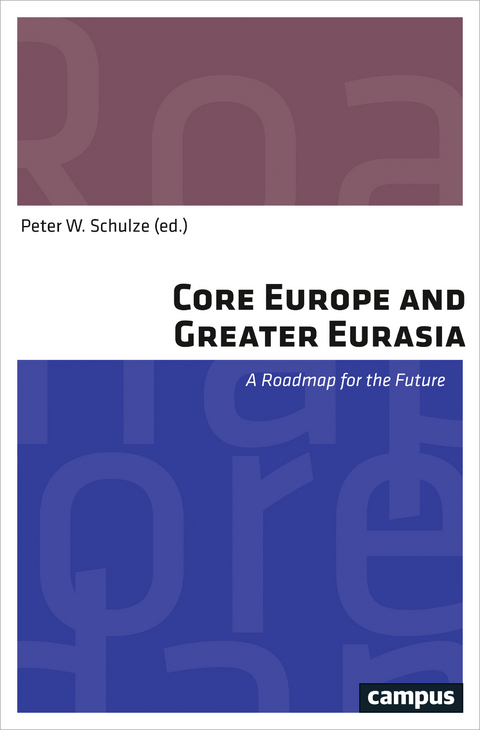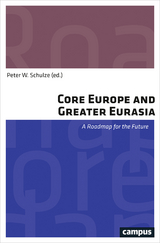Core Europe and Greater Eurasia
Peter W. Schulze ist Privatdozent für Internationale Politik an der Universität Göttingen und Gründungsmitglied des DOC RI Berlin.
Contents
Foreword9
Peter W. Schulze
Introduction: Quo Vadis Europe-The End of a Dream?11
Wendelin Ettmayer
Part I:
A Comprehensive Peace Order in Europe: Myths, Narratives, Mistakes, and Perspectives
The Future of the EU: What Is at Stake?23
Walter Schwimmer
Pendulum: The EU's Political Choices Beyond Exclusive Transatlanticism35
Raffaele Marchetti
Core Europe: Overcoming the EU's Existential Crisis53
Winfried Veit
Europe's Commonwealth: Greater Europe Beyond Core EU and Economic Eurasia71
Adrian Pabst
Russia and the West: Ideas "For Better Times"95
Klaus Wittmann
Restarting the Dialogue for European Peace? Chances and Limitations of Western Politics105
Martin Hoffmann
Part II:
Europe in a Globalised Environment: Threats of Terrorism, Migration, and Border Conflicts and the Need for
Security Assurances
Germany, Russia, and the Future of Security in Europe111
Vasily Fedortsev
Steps Toward a Collective European Security Policy: A Proposal for a Roadmap135Peter W. Schulze
Smaller and Larger Nations: Concert of Big Powers or Fair Balance of Interests?
Conflicting Geostrategic Concepts for Europe's Security157
Karsten D. Voigt
Part III:
From Greater Europe to Greater Eurasia: Science, Transport, Trade, and Infrastructure as Means of Connecting the Continent
European Energy Security: Challenges in Diversifying and Decarbonising the Energy Fuel Mix165
Lutz Mez
Greater Eurasia: Perceptions from Russia, the European Union, and China177
Anna Kuznetsova
The New Silk Road and Eurasia's Reconnection: Implications for Europe and Germany197
Jacopo Maria Pepe
Notes on Contributors221
Index223
Foreword
Peter W. Schulze
In 2016, two interconnected events unleashed the potential to change or even deconstruct major trends which have shaped the configuration of international actors for decades. Brexit could undermine the economic and political unity of the European Union and bring both its enlargement and its objective of being regarded as a relevant geopolitical actor to a standstill. Additionally, the election of a US president whose "America First" policy oscillates so extensively between more protectionist and less interventionist goals, without any strategic concept at the centre, will weaken Washington's globally hegemonic position.
Nonetheless, the "New World Order" cheerfully announced by the Bush administration after the collapse of the USSR put an end to the bipolar system and ended threats of Europe's nuclear annihilation in a case of war. In retrospect however, Eastern and Western experts both agree that neither the bipolar order nor the United States' subsequent unipolar hegemony have succeeded in creating a peaceful world. The inclusion of most former Warsaw Pact countries within NATO and the EU factually eliminated the danger of European interstate warfare; but a unified security order encompassing all European states has not emerged. Pushing aside the opportunity offered by the Charter of Paris, Europe has been divided into several spaces of security. While Western Europe has enjoyed security and economic wellbeing, institutionally enshrined in NATO and the EU, the majority of the CIS countries have only been limply regulated by Russia in security arrangements, the Collective Security Treaty Organization (CSTO), and the Eurasian Economic Union (EEU). Moreover, the space stretching from the Baltic Sea to the area in between the Black and Caspian seas, Europe-in-between, is composed of states too politically unstable, economically weak, and torn apart socially by ethnic strife to guarantee either the welfare or the security of their citizens. The present crisis in Ukraine is indicative of the complexity of internal problems and their exploitation by outside forces.
Undoubtedly, the last decade of the twentieth century and the first decade of the new millennium witnessed fundamental shifts in the power constellation of international actors. So far, transformations have been influenced by the interplay of Washington, Moscow, and Beijing, and, less significantly, by the European Union: The current global order, established by the hegemonic US and founded on liberal institutions and universal values, is now being challenged by nascent counter forces. If successful, these forces will eventually create a multipolar or polycentric global order. Nevertheless, the central question remains unanswered: can the emerging polycentric global order provide security and welfare for the international community?
In the midst of these changes on a global scale, the European integration process has run into an impasse of internal contradictions and external challenges. The EU is undoubtedly in dire need of reform; some European perestroika and glasnost are required. The debate on deepening versus widening which dominated the 1980s has appeared on the agenda again, but has been addressed differently.
Given the economic and political turbulence since 2009, widening seems to be out of the question for the foreseeable time. But deepening is subject to harsh populist reactions. Core Europe, the democratisation of the EU, and/or the regression to a commonwealth of nation-states that reduces supranational authority, are fiercely debated concepts. The issues are complicated by the impasse of EU-Russia relations which had already started nine years ago but escalated to reciprocal sanctions during the Ukraine crisis. Antagonistic narratives on both sides have caused the destruction of a formerly high-level and intensive network of interest-based, cooperative, multilateral and bilateral relations. But the question is: how to reach
| Erscheinungsdatum | 11.08.2017 |
|---|---|
| Co-Autor | Vasily Fedortsev, Gustav Gustenau, Martin Hoffmann, Maria Pepe Jacopo, Anna Kuznetsova, Raffaele Marchetti, Lutz Mez, Adrian Papst, Peter W. Schulze, Walter Schwimmer, Winfried Veit, Karsten Voigt, Klaus Wittmann |
| Verlagsort | Frankfurt |
| Sprache | englisch |
| Maße | 140 x 213 mm |
| Gewicht | 293 g |
| Themenwelt | Sozialwissenschaften ► Politik / Verwaltung ► Europäische / Internationale Politik |
| Sozialwissenschaften ► Politik / Verwaltung ► Vergleichende Politikwissenschaften | |
| Schlagworte | Außenpolitik • Eurasien • Europa • Europäische Union • Europäische Union (EU) • Internationale Beziehungen • Internationale Politik • Kerneuropa • Russland |
| ISBN-10 | 3-593-50784-6 / 3593507846 |
| ISBN-13 | 978-3-593-50784-2 / 9783593507842 |
| Zustand | Neuware |
| Haben Sie eine Frage zum Produkt? |
aus dem Bereich




